
email us
ted@chattanoogaroofingco.com

call us now
(423) 308-ROOF
Roofing solutions
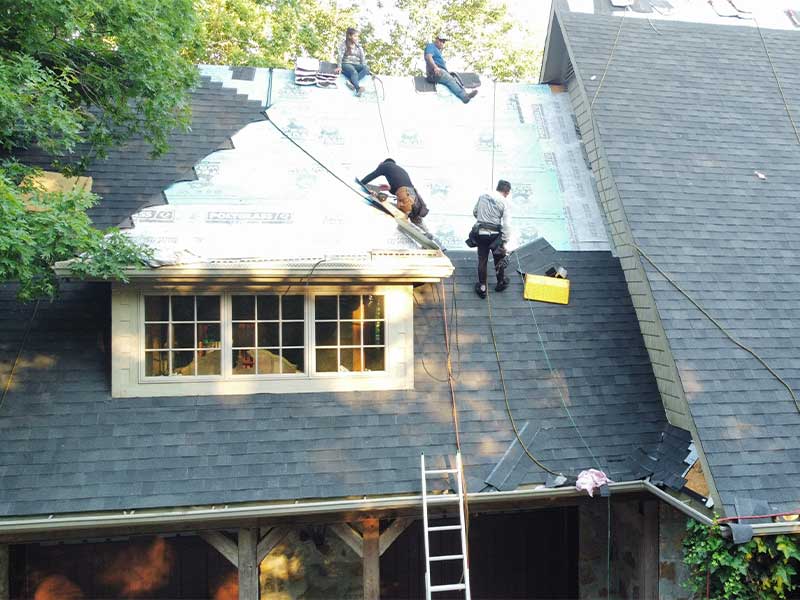
21 Sep. 2024
Longevity and Durability: Choosing a Roof Installation That Will Last
Longevity and Durability: Choosing a Roof Installation That Will Last
As a homeowner, investing in a roof installation is one of the most significant decisions you’ll have to make for your property. With so many options available, it can be overwhelming to find the right roofing solution that not only looks aesthetically pleasing but also stands the test of time. After all, no one wants to deal with the hassle and cost of constantly repairing or replacing their roof. This is why choosing a durable and long-lasting roof should be a top priority when considering any exterior renovations. In this blog post, we’ll delve into the key factors you need to consider when selecting a roof installation that will provide longevity and durability for your home. So if you’re in the market for a new roof or simply curious about what makes certain roofs more durable than others, keep reading!
Roofing material durability
As one of the most critical components of a building structure, the roofing material plays a crucial role in protecting the property from external factors such as weather damage, physical impact, and insulating the interior. Choosing the right type of roofing material is, therefore, a critical decision that requires a thorough evaluation of factors, such as lifespan and weather resistance, among others. When considering the durability of roofing material, it is essential to look at the specific climatic conditions of the region in which the building is located. For instance, Asphalt shingles, while relatively affordable, may be susceptible to damage due to high winds, heavy rain, and extreme weather conditions. In contrast, Metal roofing offers outstanding durability, with a lifespan of up to 50 years and exceptional weather resistance, making it an ideal choice for regions that experience extreme weather conditions. Additionally, Tile roofing is a popular choice for its elegance and longevity, boasting a lifespan of up to 100 years and excellent resistance to fire, wind, and hail. Irrespective of the roofing material choice, regular maintenance and inspection are crucial in ensuring the integrity and longevity of the roof. By carefully evaluating the specific roofing material’s lifespan and weather resistance, property owners can make an informed decision and ensure that their investment is well protected.
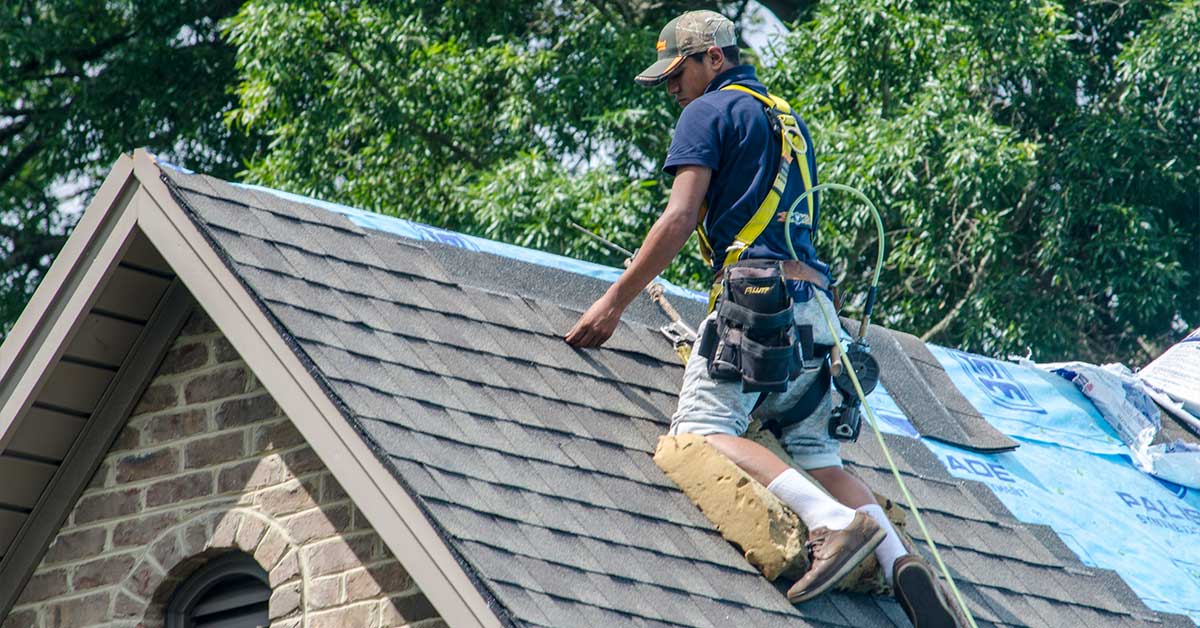
Roof Installation
Roof pitch and ventilation
Roof pitch and ventilation play vital roles in the overall health and longevity of any roofing system. Ensuring the proper slope and airflow are imperative to prevent the damaging effects of moisture from infiltrating your home. This occurs because stagnant air and moisture can accumulate in an improperly vented and sloped roof structure, leading to harmful mold and mildew growth, and ultimately compromising the structural integrity of your roof. Therefore, it is crucial to consider both the pitch and ventilation of your roof during the installation process, as well as any time you plan to do any major roofing work. Expert roofing contractors understand that improper ventilation and slope can lead to major roofing headaches in the long run, and will take care to inspect and correct any issue before it turns into a large-scale problem. So, whether you are installing a new roof or maintaining an existing one, be sure to give careful attention to the pitch and ventilation of your roofing system, to ensure its longevity and protect your home from dangerous moisture damage.
Underlayment and moisture barriers
Underlayment and moisture barriers are essential components of any roofing system. They provide an added layer of protection that enhances the durability and longevity of the structure. High-quality underlayment can effectively guard against moisture, wind, and even UV radiation, preventing damage to the roof and water from penetrating the home’s interior. Besides, moisture barriers provide an essential function in preventing moisture from undermining the roof’s integrity, leading to costly leaks and damage. Choosing the right underlayment and moisture barrier can help create a robust barrier against the elements, ensuring the roof stands the test of time while reducing energy consumption. It’s worth noting that the right choice and installation could ultimately save homeowners thousands of dollars by preventing costly repairs and keeping their home’s interiors safe. In summary, investing in proper underlayment and moisture barrier is a key decision that will pay off all the way.
Fastener selection
Fastener selection is a critical aspect of any construction project. Choosing the right type of nails is essential when it comes to ensuring the durability and longevity of the finished structure. Hot-dipped galvanized or stainless steel nails are the preferred option for many construction professionals due to their inherent resistance to rust and corrosion. These nails are specially treated to prevent rusting, making them ideal for use in harsh climates where moisture and humidity are common. Hot-dipped galvanized nails are the ideal choice for projects located in coastal areas or those exposed to saltwater spray, as they offer superior resistance to rust and corrosion. Stainless steel nails, on the other hand, are more suitable for projects located in dry, arid climates. Choosing the right type of nail for your construction project could mean the difference between a structure that lasts for decades and one that requires frequent repairs or replacement. By taking the time to select the appropriate nails, you can ensure that your project will stand the test of time and withstand the elements, no matter where it is located.
Skylight and vent flashing
Skylight and vent flashing play a critical role in protecting the roof against water damage. Flashing is essential in areas where the roofing material meets a vertical surface or protrusion, such as vent pipes, skylights, chimneys, and walls. Without proper flashing, water can easily penetrate these areas, causing leaks and moisture damage to the underlying structure. That is why it is essential to ensure that flashing is properly installed and sealed. Skylight and vent flashing are commonly made of rust-resistant metals like aluminum, copper, and stainless steel, which can withstand exposure to the elements and effectively channel moisture away from the roof’s surface. With the correct installation and sealant, these materials can provide long-lasting protection against leaks and water damage. Investing in quality skylight and vent flashing can not only save you money on repairs but also extend the life of your roof.

Roof Installation
Inspecting for wear
Inspecting for wear is a vital aspect of any maintenance program, and it must be done correctly. When it comes to checking for curling, cracking, or damage – particularly near the end of the material lifespan – attention to detail and focus is paramount. Deeper inspections can reveal subtle signs of wear that may not be immediately noticeable to the naked eye. The key to effective inspection is keeping abreast of the latest developments in inspection technology. With the right tools and techniques, maintenance personnel can detect the early signs of wear, identify potential causes, and take corrective action before major issues develop that can compromise performance or safety. Inspecting for wear is a challenging task, but it is also a vital one that should never be neglected. So, ensuring that everything is done correctly is of utmost importance.
In conclusion, choosing the right roofing material and ensuring proper installation can greatly impact the longevity and durability of your roof. Whether it be asphalt shingles, metal roofing, or tile roofing, each option has its benefits and drawbacks. However, by considering factors such as weather resistance and lifespan, you can make an informed decision that best suits your needs. Additionally, don’t underestimate the importance of proper roof pitch and ventilation to prevent moisture issues. And don’t forget about using high-quality underlayment and moisture barriers to protect against wind and water damage. Pay attention to fastener selection as well – using appropriate nails for your climate can make a world of difference in the longevity of your roof. Always make sure to properly seal flashing around skylights and vents to avoid potential leaks. Lastly, regularly inspecting your roof for wear and tear is crucial, especially as it nears the end of its lifespan. By following these tips and making necessary repairs or replacements when needed, you can ensure that your roof remains strong and dependable for years to come. Don’t wait until it’s too late – take action now for a safe and secure roof over your head.
Chattanooga Roofing Company
https://www.google.com/maps?cid=3134983317498625437
https://www.google.com/maps?cid=3134983317498625437
(423) 401-6407
- By: Collaborate
- Roofing solutions, Affordable roofing, Quality roofing, Installing Roofs, New Roof Installation, Roofing Installers, roof replacement, Roof Construction, roofing company, Roofing Repairs, roofing services, Professional Roofing, residential roofing, Expert Roofing, commercial roofing, roofing contractor, roofing installation, best roofing installation, Roofing specialists, Roofing contractors near me
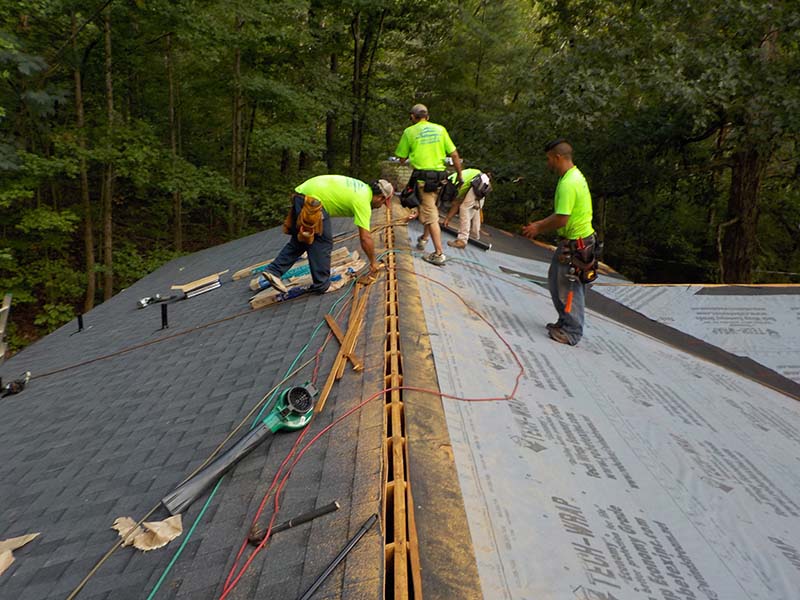
07 Sep. 2024
How to Choose the Right Roofing Company Near You: A Comprehensive Guide
How to Choose the Right Roofing Company Near You: A Comprehensive Guide
Finding the right roofing company is a critical decision that homeowners and business owners must make with care. The integrity of your roof affects not only the aesthetic appeal of your property but, more importantly, its safety and durability. This comprehensive guide is designed to help you navigate the process of selecting the best roofing company for your needs, ensuring long-term satisfaction and peace of mind.
The Importance of Choosing the Right Roofing Company
Choosing the right roofing company goes far beyond simply finding someone to replace or repair your roof; it involves entrusting the safety, durability, and overall integrity of your home to professionals who fully grasp the critical nature of their task. A high-quality roof is much more than an aesthetic feature; it serves as the first line of defense against the harshness of environmental elements, tirelessly protecting your property from the relentless assault of rain, wind, scorching heat, and other weather-related challenges that can arise unexpectedly.
Opting for a reputable and experienced roofing company can lead to long-lasting roofing solutions that not only enhance the visual appeal of your home but also significantly reduce the likelihood of future damages, thereby sparing you from the stress and financial burden of unnecessary repair costs. Moreover, the right roofing contractor will ensure that the materials used in the construction of your roof are of the highest quality, sourced from reputable suppliers, and that the installation process strictly adheres to the latest industry standards and best practices, further enhancing both the value and lifespan of your roof.
The installation of a roof is a meticulous process that requires precision, expertise, and a deep understanding of both the materials involved and the environmental conditions the roof will need to withstand. This makes the choice of a roofing company a critical decision—one that can significantly impact not only the immediate outcome of the roofing project but also the long-term safety, aesthetics, and investment value of your property.
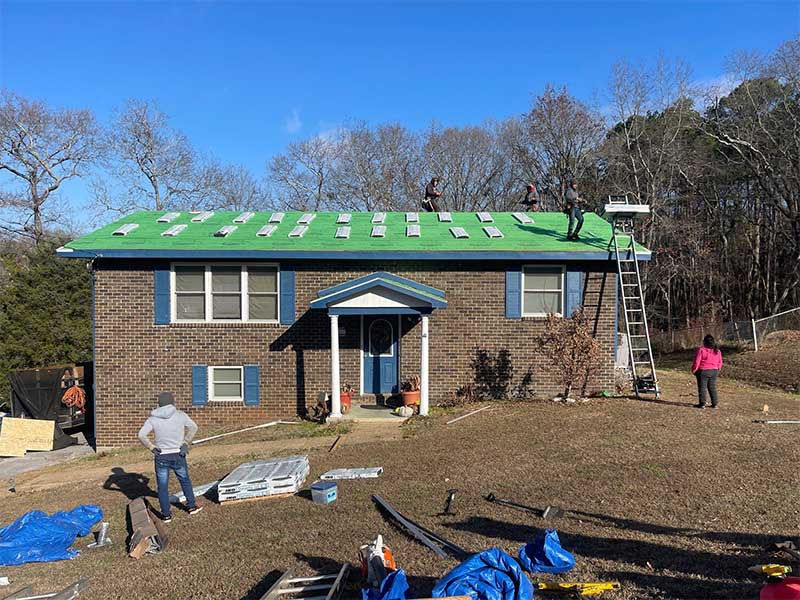
Roofing Company
Understanding Your Roofing Needs: Residential vs. Commercial
Before choosing a roofing company, it’s essential to understand the key differences between residential and commercial roofing systems, as each has unique requirements and challenges. Residential roofing typically involves steep slope applications with options like asphalt shingles, tile, or metal roofing materials. These materials are chosen for their aesthetic appeal, durability, and ability to protect homes from the elements. Residential roofs tend to be more straightforward in design, focusing on architectural style and personal preference.
On the other hand, commercial roofing systems are often flat or have a low slope and require materials that can cover larger surface areas effectively. These systems might utilize built-up roofing (BUR), single-ply membranes (such as TPO, PVC, or EPDM), or modified bitumen. Commercial roofs must withstand a different set of environmental stresses, including heavy equipment, foot traffic, and potentially harmful chemical exposures. They also need to consider factors such as drainage, insulation, and compliance with local building codes, which are far more stringent.
Recognizing whether your roofing project is residential or commercial is crucial, as it influences the choice of materials, design considerations, installation processes, and, ultimately, which roofing company is best equipped to meet those specific needs. Roofing contractors often specialize in either residential or commercial projects, so identifying your requirements early on will help narrow down your options to those most capable of providing the expertise and service your project demands.
Qualities to Look for in a Reliable Roofing Company
When searching for a reliable roofing company, several key qualities should guide your decision-making process. These characteristics ensure that you select a contractor who will not only do the job right but also provide value and assurance throughout the lifespan of your roof.
- Licensing and Insurance: A reputable roofing company should have all necessary licenses for operating in your area, ensuring they adhere to all local building codes and regulations. Insurance, including liability and worker’s compensation, is equally critical, as it protects you from any potential liabilities in case of accidents or damage to your property during the project.
- Experience and Reputation: Look for a company with a solid track record of quality workmanship and positive customer feedback. Experienced roofers are more likely to recognize and effectively address any challenges specific to your roofing project. Online reviews, testimonials, and references can provide valuable insights into the company’s reputation and the satisfaction of past clients.
- Detailed Quotes and Contracts: A reliable roofing company will offer a detailed quote that outlines the scope of work, materials to be used, timelines, costs, and payment terms. This level of transparency helps prevent any unexpected expenses or disputes. A formal contract should also be presented before any work begins, ensuring both parties are clear on the expectations and obligations.
- Communication and Professionalism: Excellent communication is crucial for any successful roofing project. A trustworthy company will keep you informed at every step, from the initial assessment to the completion of the project. Professionalism in their dealings, timeliness, and the way they handle queries or concerns reflects their commitment to customer satisfaction.
- Warranty and After-Sales Service: A quality roofing company stands behind their work with a warranty that covers both materials and labor. This shows confidence in their workmanship and provides you peace of mind knowing that any future issues will be addressed. After-sales service, including maintenance and repairs, is also a sign of a dependable company that prioritizes long-term relationships with their clients.
Finding a roofing company that embodies these qualities will help ensure that your roofing project is completed efficiently, effectively, and with the highest level of professionalism.
How to Research and Shortlist Potential Roofing Companies
Researching and shortlisting potential roofing companies involves a thorough process to ensure you find a reputable provider that meets your specific needs. Begin by conducting an online search to identify companies in your area, paying close attention to those with professional websites and positive customer reviews on platforms such as Google, Yelp, or industry-specific sites like Houzz or Angie’s List. It’s wise to check the Better Business Bureau (BBB) for any accreditation and to see if any complaints have been filed against the companies.
Networking with friends, family, or neighbors who have recently undergone roofing projects can provide firsthand insights and recommendations. Their experiences can help you gauge the reliability, professionalism, and quality of work offered by certain contractors.
Once you have a preliminary list of companies, examine their online presence for evidence of their work, such as project galleries, and look for any industry certifications that indicate a professional commitment to quality and ongoing education. Additionally, verify their licensing and insurance directly with them to ensure they are up to date.
Narrow down your list by assessing which companies specialize in the roofing services you need, whether residential or commercial, and consider their experience with the specific materials you’re interested in. Reach out to each for an initial consultation or quote, noting their responsiveness, willingness to answer questions, and overall approach to customer service.
This process will help refine your list to a select few roofing companies that not only meet your project’s requirements but also exhibit a strong potential for delivering satisfactory results.

Roofing Company
What to Expect from a Professional Roofing Company
When engaging with a professional roofing company, clients should anticipate a high level of service that encompasses several key aspects, beginning with an in-depth consultation and evaluation of their roofing needs. During this initial consultation, representatives should offer thorough insights into the best materials and approaches suited to the project’s unique requirements, considering factors such as climate, the building’s architecture, and budget constraints.
- Site Inspection and Project Planning: A detailed site inspection is an essential step, where the roofing experts assess the current condition of your roof, identifying any underlying issues that need addressing before work begins. This is followed by the development of a comprehensive project plan that outlines the scope of work, project timelines, and an estimated completion date.
- Clear Communication and Regular Updates: Throughout the project, a professional company will maintain open lines of communication. Clients can expect regular updates on the project’s progress, any changes to the plan, and quick responses to any questions or concerns they might have.
- Quality Workmanship and Safety Compliance: Skilled workers using high-quality materials will carry out the work. A professional roofing company is committed to safety, ensuring that all work complies with local building codes and safety regulations to protect both the workers and your property.
- Completion and Final Inspection: Upon project completion, a thorough inspection is conducted to ensure the work meets the clients’ expectations and industry standards. Clients are then provided with a complete rundown of the work performed, along with care instructions and warranty information for the materials and labor used.
- Aftercare and Support: Post-installation support is a hallmark of a professional roofing company. Clients should expect information on maintaining their new roof, along with offers of scheduled maintenance visits. Additionally, a reputable company will stand by their work, readily available to address any future concerns or warranty claims.
By setting these expectations, clients can feel confident in their choice of roofing company, assured that their investment is protected and their roofing needs are expertly met.
Conclusion
Finding a quality roofing company is crucial for the success and longevity of your roof. By researching and shortlisting potential companies, setting clear expectations, and thoroughly evaluating their credentials and services, you can ensure that your project is completed with professionalism, efficiency, and excellent results. Don’t settle for less when it comes to something as important as your roof; choose a trusted and reputable roofing company that prioritizes customer satisfaction and long-term relationships.
Chattanooga Roofing Company
https://www.google.com/maps?cid=3134983317498625437
https://www.google.com/maps?cid=3134983317498625437
(423) 401-6407
- By: Collaborate
- Roofing experts, Roofing solutions, Roof repair service, Trusted roofing company, Roofing company reviews, Affordable roofing, Roof Maintenance, Quality roofing, roofing services, Emergency roofing services, local roofing company, Licensed roofing company, residential roofing, Experienced roofing team., commercial roofing, roofing contractor, roof installation, Roofing specialists, Roofing contractors near me, Roofing professionals
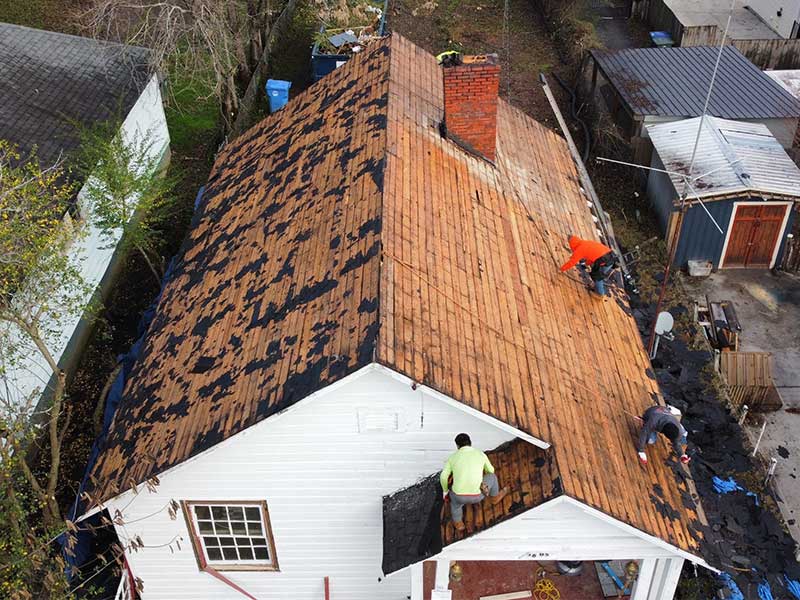
23 Aug. 2024
Roofing Companies: What You Need to Know Before Considering One
Roofing Companies: What You Need to Know Before Considering One
Choosing the right roofing company for your home or business can be a daunting task. With so many options and the importance of a durable and resilient roof, it’s essential to know what to consider before making a decision. The roofing industry is constantly evolving, and it’s critical to work with a company that stays up-to-date with the latest materials, installation techniques, and safety protocols. But how do you differentiate between reputable roofing companies and one that’s not? In this blog, we’ll provide you with the information and insights you need to make an informed decision when selecting a roofing company. By the end of this article, you’ll have a comprehensive understanding of what to look for in a roofing contractor to ensure a successful and stress-free roofing project.
Understanding the Roofing Process: From Inspection to Installation
Before diving into the details of choosing a roofing contractor, it’s important to have a basic understanding of the roofing process. This will not only help you communicate more effectively with potential contractors, but it will also give you insight into what to expect during each step of the project. The roofing process typically includes:
- Inspection: A reputable roofing company will start by conducting a thorough inspection of your roof to assess its condition and identify any potential issues.
- Material selection: Once the inspection is complete, the contractor will recommend suitable materials for your specific needs and budget.
- Preparation: Before installation can begin, preparations must be made, which may include removing old shingles or repairing damaged areas.
- Installation: This is where the actual work begins, and the new roof is installed according to industry standards and best practices.
- Cleanup: Once the installation is complete, a reputable roofing company will ensure that your property is left clean and free of debris.
It’s important to note that each roofing project is unique, and some steps may vary based on individual factors. For instance, if your roof has extensive damage, repairs may need to be made before the installation process can begin.
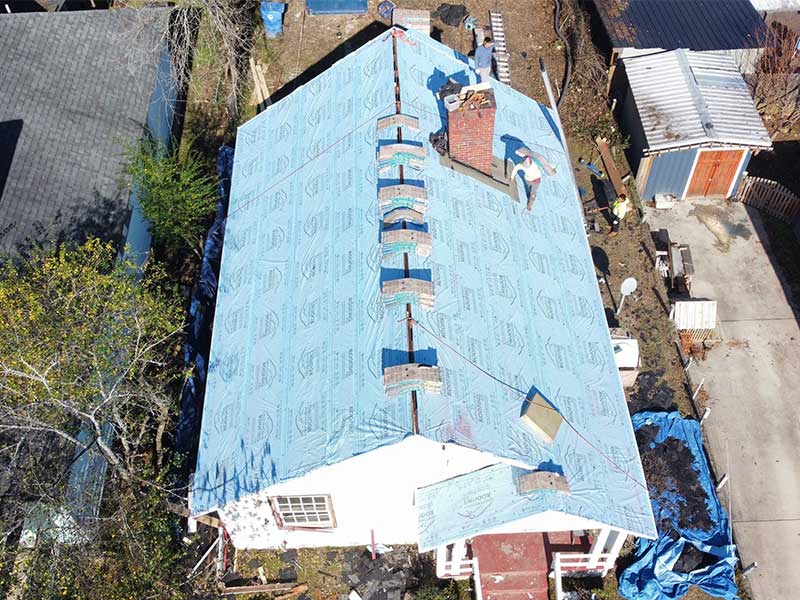
Roofing Companies
The Price Tag Explained: Breaking Down Roofing Costs
One of the most significant factors to consider when choosing a roofing company is the cost. A new roof is a significant investment, and it’s crucial to have a clear understanding of what you’re paying for. The overall price will depend on various factors, including:
- Roof size: The square footage of your roof will play a major role in determining the cost as larger roofs require more materials and labor.
- Materials: The type of roofing material you choose will also impact the price. For example, asphalt shingles are generally less expensive than metal or tile.
- Roof pitch: A steeper roof pitch may require more safety measures and scaffolding, which can increase the overall cost.
- Labor costs: Labor prices can vary between different companies and regions, so it’s important to get multiple quotes and compare them.
- Additional features: If your roof has unique features such as skylights or chimneys, this may add to the cost of the project.
It’s also essential to understand that a higher price does not always equate to better quality. It’s important to research the materials used by each company and make sure they are of high quality and meet industry standards.
Material Matters: How to Choose the Right Roofing Material for Your Home
As mentioned earlier, the type of material used for your roof can significantly impact the overall cost. However, it’s essential to consider more than just price when selecting a roofing material. Factors such as durability, maintenance requirements, and climate should also be taken into account. Some common roofing materials include:
- Asphalt shingles: These are the most popular choice due to their affordability and versatility.
- Metal roofing: This material is known for its durability and long lifespan, making it a popular choice for those looking for a long-term solution.
- Tile roofing: While more expensive than other materials, tiles offer excellent protection and can last up to 50 years with proper maintenance.
- Slate roofing: This premium material is known for its beauty and longevity but comes with a higher price tag.
When considering materials, it’s also crucial to research their energy efficiency and potential impact on your home’s curb appeal. A reputable roofing company will be able to provide you with the information you need to make an informed decision.
Warranty Wisdom: Deciphering What’s Covered and What’s Not
A warranty is a crucial aspect of any roofing project, as it provides protection and peace of mind for both the homeowner and the contractor. It’s important to thoroughly read and understand what is included in a warranty before signing any contracts. Some key factors to consider include:
- Length: The length of a warranty can vary between companies, with some offering up to 50 years of coverage.
- Coverage: Different warranties may cover different aspects of the roof, such as material defects or workmanship errors. Make sure you know what is and isn’t included in your warranty.
- Transferability: If you plan on selling your home in the future, it’s important to know if the warranty is transferable to new homeowners.
- Maintenance requirements: Some warranties may require regular maintenance to remain valid, so it’s important to understand your responsibilities as a homeowner.
Having a clear understanding of your warranty can save you from unexpected costs in the future and ensure that your roof is adequately protected. It’s always recommended to ask for written copies of any warranties and thoroughly review them before starting any work.
The Credentials that Matter: What to Look for in a Roofing Company
Aside from experience and expertise, there are several other credentials that you should look for when choosing a roofing company. These include:
- License and insurance: A reputable roofing company will have all the necessary licenses and insurance to protect their workers and your property.
- Manufacturer certifications: Many roofing materials manufacturers offer certification programs, so make sure the company you choose has these credentials.
- Warranties: Make sure the company offers warranties for both materials and labor to ensure that you are covered in case of any issues.
- References: Don’t be afraid to ask for references from previous clients. This will give you a good idea of the company’s reputation and work quality.
By taking the time to research and compare these credentials, you can rest assured that you are working with a reputable roofing company that will provide quality work and excellent customer service.

Roofing Companies
The Essential Checklist for Hiring a Roofing Company
To help you make an informed decision, here is a checklist of essential things to look for when hiring a roofing company:
- Valid license and insurance
- Manufacturer certifications
- Warranties for materials and labor
- Positive references and reviews from previous clients
- Clear communication and transparent pricing
- Knowledgeable and experienced staff
By following these guidelines, you can confidently choose a roofing company that will provide you with a quality roof and peace of mind. Remember, the right roofing company is not just about the price; it’s also about trust, expertise, and reliability. So be sure to do your research and choose wisely for your home’s protection and your peace of mind.
Choosing the right roofing company is a crucial step in ensuring a successful and stress-free roofing project. By understanding the roofing process, materials, warranties, and company credentials, you can make an informed decision that will ultimately save you time, money, and potential headaches in the future. Remember to prioritize quality over price and always do your due diligence before signing any contracts. With these tips in mind, you can confidently embark on your roofing project with the assurance that your home will be well-protected for years to come. So, take the time to research and choose wisely for your home’s protection, and enjoy the peace of mind that comes with a quality roof.
Chattanooga Roofing Company
https://www.google.com/maps?cid=3134983317498625437
https://www.google.com/maps?cid=3134983317498625437
(423) 401-6407
- By: Collaborate
- professional roofers, Licensed roofing contractors, Roof repair services, Local roofing experts, Roofing specialists, Commercial roofing contractors, Top-rated roofing companies, Experienced roofers, Roofing professionals, Affordable roofing services, Roofing contractors, Residential roofers, Roof installation companies, Roof maintenance providers, roofing services near me, Trusted roofing companies, emergency roof repair, Certified roofing contractors, roof replacement services, Roofing solutions
visit Us: 529 S. Germantown Rd. Chattanooga, TN 37411
email us: ted@chattanoogaroofingco.com
24/7 Emergency call (423) 308-ROOF

